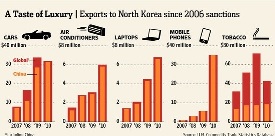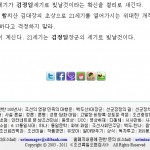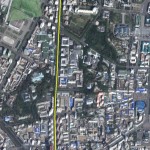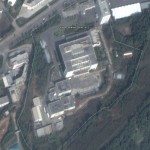Picture above via Wall Street Journal. Click image for larger version.
Quoting from the article:
An examination of U.N. and Chinese trade data reveals that exports to North Korea of products including cars, tobacco, laptops, cellphones and domestic electrical appliances all increased significantly over the past five years. Most items crossed the border from China.
The data reveal glaring loopholes in the sanctions regime, demonstrating how China has stepped in as North Korea’s main supplier of goods considered luxuries as other countries have clamped down on such exports.
But the figures also hint at the emergence of a new entrepreneurial class in North Korea rich enough to buy imported goods. Some analysts say this group could represent the strongest impetus for economic reform, and potentially undermine the totalitarian grip of the Kim family dynasty.
Since 2007, North Korea’s imports of cars, laptops and air conditioners have each more than quadrupled, while imports of cellphones have risen by more than 4,200%, with the vast majority of items coming from China, according to the U.N. data. Chinese customs data show those trends continuing in 2011.
…
“The sanctions don’t work because as long as China allows the export of luxury goods, the North Korea elite will be paid with them to support the regime,” said Jiyoung Song, an associate fellow at London-based think tank Chatham House, who has studied North Korea since 1999.
At the same time, she added, “Things like DVDs and mobile devices will help to change North Korean society in a gradual manner by teaching them about the outside world, and showing them these things don’t just come through the benevolence of their leaders.” She said last year she interviewed a North Korean defector—the daughter of a trade official—who claimed she had been given an iPad and two laptops by the “Dear Leader,” as Kim Jong Il was known.
The growing demand for Chinese consumer goods is no longer confined to the political elite, according to Andrei Lankov, a leading expert on North Korea at Kookmin University in Seoul.
He estimated that the political elite consists of a few thousand key decision-makers and about a million people with midlevel or senior positions in the bureaucracy. Most of the rest of the population of 24 million receive an official monthly salary of $2 to $3 which they can top up to about $15 by selling things in private markets, he said.
More recently, though, a new entrepreneurial class of up to 1% of the population, or about 240,000 people, has emerged that is earning at least a few hundred dollars a month, said Prof. Lankov.
“This growing demand for luxury goods is being driven by the new bourgeoisie,” he said. He said he had met a defector who as early as 2008 claimed to have been earning $1,000 a month by importing tobacco from China and selling it in North Korea in fake packaging.
It is impossible to verify who precisely is driving the demand for Chinese consumer goods. North Korea does not publicize any kind of trade data, let alone allow independent market research. But other countries do report their exports to North Korea, and figures through the end of 2010 are compiled in the United Nations Commodity Trade Statistics Database, or UN Comtrade. China’s customs authorities provide data for its exports to North Korea through last November.
Among the exports of liquor to North Korea from Hong Kong in 2010 were 839 bottles of unidentified spirits, worth an average of $159 each, and 17 bottles of “spirits obtained by distilling grape wine or grape marc” worth $145 each, according to the U.N. figures.
In 2010, North Korea also imported 14 color video screens from the Netherlands—worth an average $8,147 each—and about 50,000 bottles of wine from Chile, France, South Africa and other countries, as well as 3,559 sets of videogames from China, the U.N. data show.
Some of this might have been to cater to the small number of tourists, diplomats and foreign businesspeople in the country. Many items, however, were clearly destined for North Koreans. Cars, for example, are one of the highest status symbols, and are often given as gifts by the state to loyal senior officials.
In 2010 alone, North Korea imported 3,191 cars, the vast majority from China—although one, valued at $59,976, placing it in the luxury category. came from Germany.
One of the most striking figures is a dramatic increase in imports of mobile telephones—ownership of which was once considered a crime. In 2010 alone, the country imported 433,183 mobile phones, almost all from China, and with an average value of $81 each. Egyptian telecoms company Orascom, which launched North Korea’s first and only mobile network in 2008, said that its North Korean network had 809,000 subscribers at the end of the third quarter of 2011.
Read the full story here:
Luxuries Flow Into North Korea
Wall Street Journal
Jeremy Page
2012-1-7




